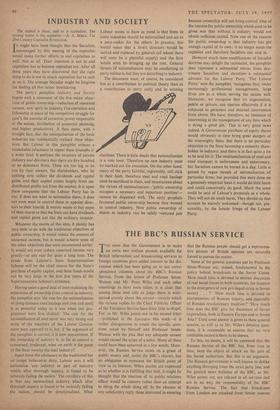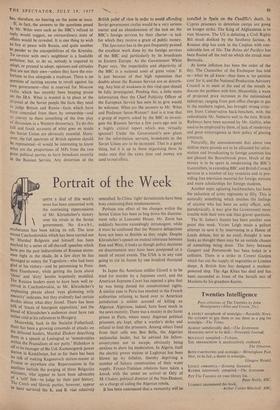THE BBC'S RUSSIAN SERVICE
THE news that the Government is to make an extra two million pounds available for British information and broadcasting services to foreign countries gives added interest to the dis- cussion which has been going on in our corre- spondence columns about the BBC's Russian Service. From the letters of Professor Seton- Watson and Mr. Peter Wiles and such other soundings as have been taken,- it is clear that among those best able to judge there is wide- spread anxiety about this service--anxiety which the various replies by the Chief Publicity Officer of the European Service have done little to dispel. For, as Mr. Wiles points out in his second letter —published in the Spectator this week—it is rather disingenuous to evade the specific ques- tions asked by himself and Professor Seton- Watson with the plea that any adequate answer would exceed the scope of a letter. Many of them could have been answered in a few words. More- over, the Russian Service exists on a grant of public money and, under the BBC's charter, has an obligation to represent the British point of view to its listeners. When doubts are expressed as to whether it is fulfilling that task, it might be thought that the reaction of its public relations officer would be concern rather than an attempt to shrug the whole thing off. In the absence of any satisfactory reply those interested in ensuring that the Russian people should get a representa- tive picture of British opinion are naturally forced to pursue the matter.
Some of the general questions put by Professor Seton-Watson are, indeed, fundamental to the policy behind broadcasts to the Soviet Union. `How much time is devoted to serious discussion of real social forces in both countries, for instance to the emergence of new privileged strata in Soviet society . . . ?"How much time is devoted to interpretation of Russian history, and especially of Russian revolutionary tradition?' How much time does the BBC give for discussion of Soviet imperialism, both in Eastern Europe and in Soviet Asia?' Until some answer is given to these general queries, as well as to Mr. Wiles's detailed ques- tions, it is reasonable to assume that no very creditable record is there to be shown.
To this, no doubt, it will be answered that the Russian Service of the BBC has, from time to time, been the object of attack on the part of the Soviet authorities. But this is no argument. The Russian government is well-known to dislike anything diverging from the strict party line, and the general news bulletins of the BBC, as Mr. Wiles points out, are relayed in all services and are in no way the responsibility of the BBC Russian Service. The fact that broadcasts from London are attacked from Soviet sources has, therefore, no bearing on the point at issue. If, in fact, the answers to the questions posed by Mr. Wiles were such as the BBC's refusal to reply would suggest, an extraordinary state of affairs would be revealed. It is one thing to wish to live at peace with Russia, and quite another to pander to the susceptibilities of the Kremlin. To co-exist with one's neighbour is a laudable ambition; but, to do so, nobody is required to adopt, or pretend to adopt, opinions and attitudes that are not their own—unless they have the mis- fortune to live alongside a madman. There is no question of inciting anyone to revolt against his own government—that is reserved for Moscow radio, which has recently been heaping praise on the IRA. What is wanted is to place at the disposal of the Soviet people the facts they need to judge Britain and Russia—facts which have been concealed from them by censorship—and to convey to them something of the free play of discussion in a Western democracy. To do this full and frank accounts of what goes on inside the Soviet Union are obviously essential. More- over, the full spectrum of British opinion should be represented—it would be interesting to know What are the proportions of MPs from the two great political parties to have broadcast recently In the Russian Service. Any distortion of the British point of view in order to avoid offending Soviet government circles would be a very serious matter and an abandonment of the task set the BBC's foreign services by their charter—a task for which they receive a grant of public money.
The Spectator has in the past frequently praised the excellent work done by the foreign services of the BBC and particularly by its broadcasts to Eastern Europe. As the Government White Paper says, 'the impartiality and objectivity of the BBC is a national asset of great value.' It is just because of that high reputation that doubts about the Russian Service are so disturb- ing. Any hint of weakness in this vital spot should be fully investigated. Pending that, a little more information than the Chief Publicity Officer of the European Service has seen fit to give would be welcome. What are the answers to Mr. Wiles and Professor Seton-Watson? And is it true that a group of experts asked by the BBC to investi- gate the Russian Service a few years ago sent in a highly critical report which was virtually ignored? Under the Government's new plans for the information services, broadcasts to the Soviet Union are to be increased. That is a good thing, but it is up to those organising them to make sure that the extra time and money are used to real effect.















































 Previous page
Previous page